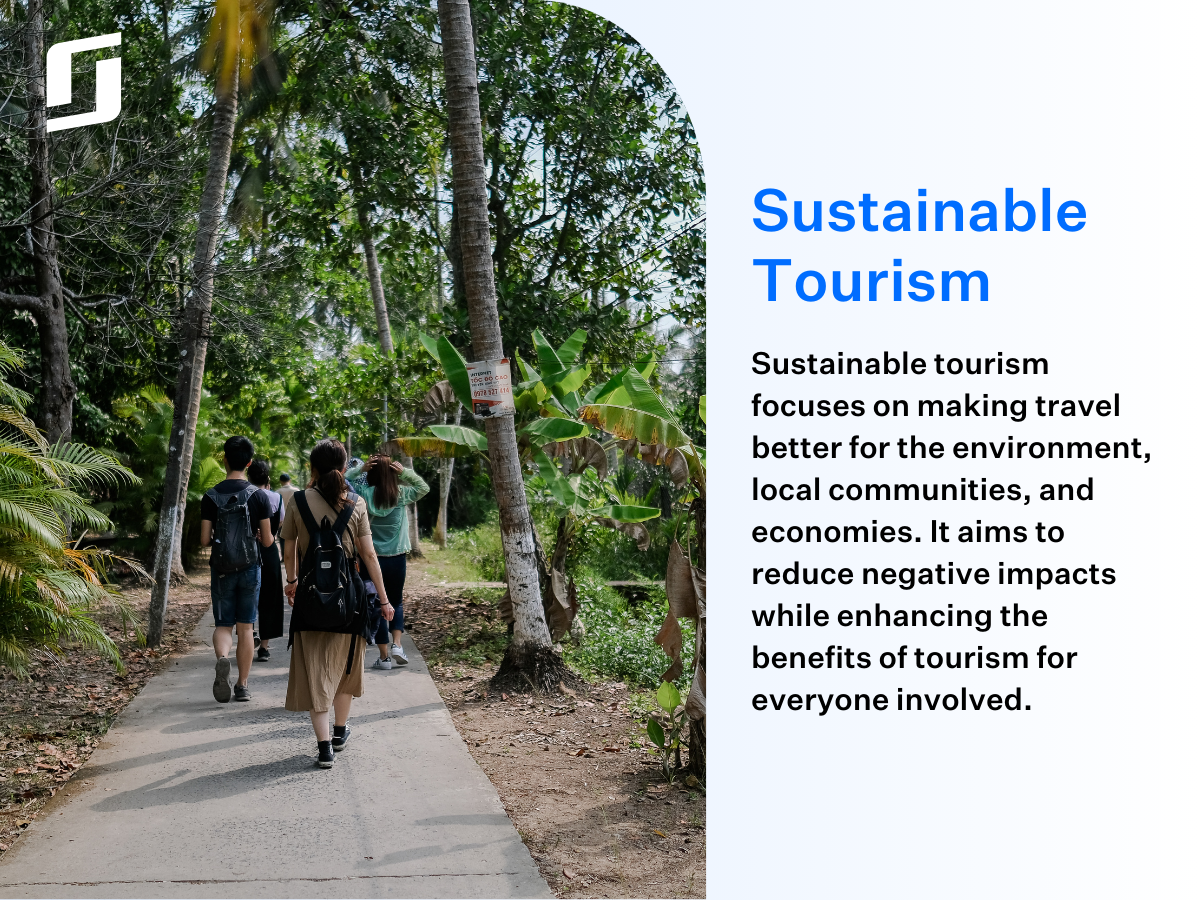What is sustainable tourism?
Sustainable tourism is an approach designed to minimise the environmental impact of hotels and other travel service providers, while supporting local communities and promoting long-term economic viability.
While this sustainable tourism definition encompasses environmental, economic and cultural sustainability, the term is most often used to describe eco-conscious travel.
Sustainable travel and tourism has come into sharp focus in the last decade or two, as awareness surrounding issues like climate change and ecological degradation has grown.
In this guide we’ll look at how sustainable tourism represents a real opportunity for hotels that are willing to invest in it, by reducing operating costs, attracting eco-conscious travellers, and ensuring a destination remains beautiful, healthy and alluring long into the future.
Table of contents
Why is sustainable tourism important?
The importance of sustainable tourism for hotels is two-fold:
- As a business concern, a focus on sustainability ensures you cater to the ever-expanding group of travellers who identify as eco-conscious, and that you minimise your operational costs through energy efficiency and waste reduction strategies.
- As a broader concern, sustainable tourism encourages the industry to do the right thing in terms of the environment and local community, and helps to ensure that stunning, vibrant destinations stay that way in the long-term.
The once-niche sustainable tourism market has long since gone mainstream, so hotels that don’t go green risk being left behind as sustainability becomes a non-negotiable.
Gen Z, for example, are travelling more than other generations, and are also more concerned about the environment.
Enhance your sustainability efforts with SiteMinder
The world’s leading hotel platform, SiteMinder, helps you enhance the sustainability of your hotel business by maximising both revenue and operational efficiency.
Learn more
Sustainable tourism examples
To understand what sustainability looks like in the hospitality industry, let’s check out some real-world examples of sustainable tourism destinations from around the world.
Lemon Tree Hotels
This Indian chain’s hotels are all LEED (Leadership in Energy and Environmental Design) Gold Certified, a globally recognised sustainable tourism standard. Variable refrigerant volume (VRV) technology makes air-conditioning 30% more efficient, with the HVAS system also powered by solar and wind. On the community side, the chain has organised a number of neighbourhood clean up efforts, and has won awards for their working conditions and approach to staff welfare.
Proximity Hotel
This US hotel, in Greensboro, North Carolina, is LEED Platinum Certified (the highest certification possible) thanks to a range of initiatives. The building itself was constructed from sustainable building materials, while inside the focus is on reducing water and power usage, recycling every material possible, using renewable energy and promoting sustainable food sourcing.
Jetwing Vil Uyana Hotel
This Sri Lankan hotel isn’t in a wildlife sanctuary – it is a wildlife sanctuary. Jetwing Vil Uyana was established in 2006, and has since transformed 28 acres of agricultural land back into a gorgeous wetlands. The hotel monitors every aspect of its environmental impact – energy, water, waste and more – and reports its progress monthly, while submitting itself to regular audits.

Sustainable tourism practices for hotels
What might sustainability look like in your hotel business? The following sustainable tourism policies and practices can serve as inspiration for any accommodation provider looking to up their game.
Electricity & water
Sustainability is about using resources wisely. By increasing efficiency and reducing waste, you make your hotel more environmentally friendly while also reducing your operating costs. In terms of power and water, consider:
- Investing in on-site renewable energy systems like solar, wind and battery storage.
- Installing devices like smart HVAC and lighting systems that use less energy while running, and automatically switch themselves off.
- Conserving water through water-saving shower heads and smart washing systems.
- Recycling water using an on-site system.
Waste reduction
Waste, particularly in terms of plastics that don’t readily break down, can harm the environment on both a local and global level. By reducing waste, you make your destination a nicer place to visit, and lower the cost of dealing with garbage.
- Replace single use items like disposable cups and cutlery with reusable alternatives.
- For any single use items you can’t replace (e.g. for sanitary reasons), choose a biodegradable alternative.
- Implement an easy-to-follow recycling system for both staff and guests.
Supporting local tourism initiatives
Join, or better yet establish, sustainable tourism initiatives within the local community. Forge partnerships with groups that work to keep the local area beautiful, the local culture vibrant and the local economy strong.
Employ locals and pay a fair living wage. Sponsor local events. Support local businesses by offering their products and services through your front desk.
Benefits of sustainable tourism practices
Why bother with the projects and practices mentioned above? Simple: it’s good for business.
As the awareness of environmental issues grows, so does the global sustainable tourism market. Eco-conscious travellers are increasingly looking for sustainable tourism hotels that align with their beliefs and desires. By offering an option that these customers feel good about choosing, you can attract more guests and potentially charge a higher nightly rate.
Add in the cost savings from reduced waste and lower utility bills, and enhanced sustainability can also lead to enhanced profitability.
Other benefits of sustainability include:
- Greater guest appeal: Eco-conscious travellers prefer hotels with strong sustainability commitments, as they can enjoy a natural and entirely guilt-free stay.
- Improved brand reputation: Demonstrating environmental and social responsibility enhances your hotel’s image.
- Competitive advantage: Sustainability awards like LEED, Green Key and GSTC hotel certifications can lead environmentally aware guests (including valuable corporate clients) to choose you over a competitor.
- Regulatory compliance: Meeting sustainability standards helps hotels to stay ahead of evolving environmental regulations.
- Stronger community relationships: Taking social responsibility seriously by supporting local businesses and employing local staff can foster goodwill and loyalty within the community, and can lead to more referral business.
- A healthier environment: By reducing pollution and emissions through waste management and renewable energy initiatives, you can improve everything from aesthetics to air quality. This makes your hotel a nicer place to be for guests, and a nicer place to work for staff.
- Long-term viability: Responsible, sustainable practices help to safeguard the future of your hotel business, by enhancing profitability and ensuring the health of the local environment and community within which you work.
In order to fully capitalise on the potential benefits of sustainable tourism, you need help from a tool that can guide you on the right rates to charge, that can help you implement sustainability processes, and that can get the word out about your sustainability efforts.
You need a tool like SiteMinder…

